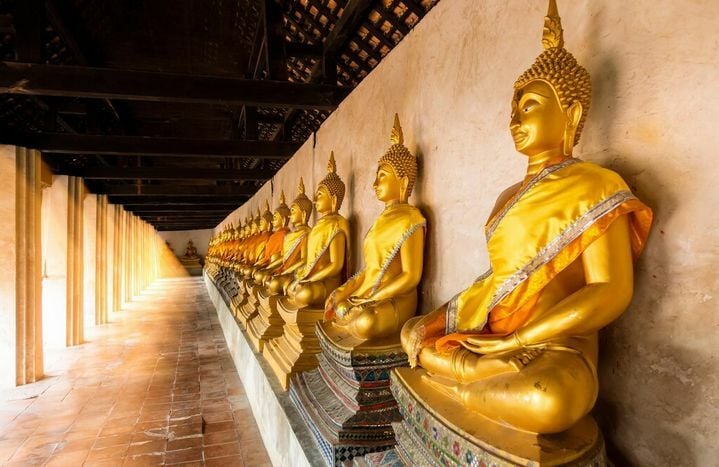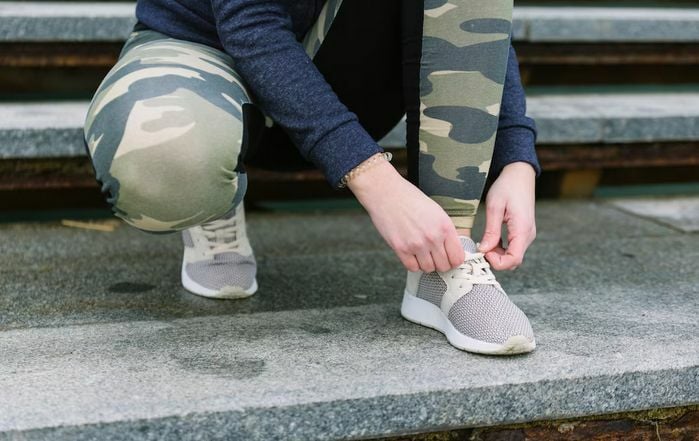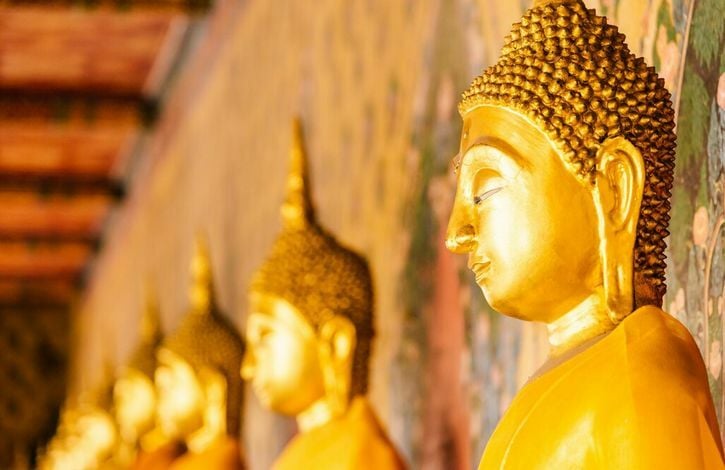Things you should not do to Thai person

Thailand, with its rich cultural tapestry and warm hospitality, attracts millions of visitors each year. However, navigating the social landscape requires more than just knowing the best tourist spots. Understanding what’s considered rude or inappropriate can make a significant difference in your interactions with locals. This article is gathering what you should never do to a Thai person.
Things you should never do to a Thai person.
Do take your shoes off

In Thailand, it’s customary to remove shoes before entering homes, temples, or some businesses. This practice helps keep indoor spaces clean. Ignoring this can be seen as disrespectful. When visiting a Thai residence or temple, always take your shoes off at the entrance. Look for a pile of shoes or observe what others are doing to guide your actions.
Even some cafes and restaurants expect you to leave your shoes at the door, especially if they’re in residential areas. Simpler footwear makes this easier. This cultural norm is deeply rooted in showing respect and maintaining cleanliness.
Avoid stepping on the door threshold directly. It’s believed that spirits reside in the threshold, and stepping on it could bring bad luck to the residents. Instead, step over it.
This nuanced etiquette is an essential part of Thai culture. Observing it shows respect and understanding of local customs. Never do anything to offend, like ignoring these simple practices. Always be mindful to take your shoes off when required.
Disrupt a prayer or ceremony
 In Thailand, interrupting a prayer or ceremony is seen as deeply disrespectful. These events often hold significant religious and cultural importance. Silence is golden during such times. Talking loudly, using mobile phones, or walking in front of those praying can offend. Observers should always remain quiet and attentive.
In Thailand, interrupting a prayer or ceremony is seen as deeply disrespectful. These events often hold significant religious and cultural importance. Silence is golden during such times. Talking loudly, using mobile phones, or walking in front of those praying can offend. Observers should always remain quiet and attentive.
If they encounter a prayer session in progress, they should wait patiently until it concludes. Moving quietly and respectfully is crucial. It’s also essential to dress modestly when attending any ceremony. Revealing clothing is frowned upon.
Photography during ceremonies should only occur if permitted. Flash and loud camera noises are major disturbances. When in doubt, they should ask a local or refrain from taking pictures altogether.
Showing reverence and awareness of these sensitivities strengthens traveller-local relationships. Those who understand and practise these customs will find the experience more enriching and respectful.
Fake a wai
Faking a wai is disrespectful in Thai culture. The wai is a traditional Thai greeting where one bows slightly with palms pressed together. Only use it when it’s appropriate. Thai people consider it a sign of respect and gratitude. Doing it improperly can offend locals.
When greeting, ensure you understand its context. Perform a wai when meeting elders or during formal events. If uncertain, a polite nod or bow is sufficient. Being genuine in your interactions matters more than mimicking a cultural practice.
Tourists should never do a wai sarcastically or mockingly. Such gestures can be seen as rude and dismissive. Respect their customs by taking the time to learn them properly. This approach fosters mutual respect and enhances your travel experience.
In sum, a wai should be performed with sincere intent. Doing so shows genuine respect for Thai traditions. Always engage with cultural practices thoughtfully and appropriately.
Take wildlife selfies
 In Thailand, taking selfies with wildlife is not only frowned upon but often considered unethical. Many tourists might think capturing a moment with exotic animals is innocent. However, this practice supports animal exploitation. Wildlife in captivity typically endures substandard conditions, often subject to abuse.
In Thailand, taking selfies with wildlife is not only frowned upon but often considered unethical. Many tourists might think capturing a moment with exotic animals is innocent. However, this practice supports animal exploitation. Wildlife in captivity typically endures substandard conditions, often subject to abuse.
Heeding local wisdom is crucial. If someone never does take wildlife selfies, they respect Thai values and animal welfare. Institutions promoting animal interactions might hide the harsh realities behind the scenes. Tourists should instead seek ethical animal sanctuaries where the well-being of creatures is prioritised.
Not only does taking wildlife selfies harm animals, but it also perpetuates irresponsible tourism. In many cases, such practices contravene local laws designed to protect native species. Always opt for observing animals in their natural habitat. Choose bona fide wildlife tours that ensure no harm comes to the species or the ecosystem.
Never do these practices if one desires a culturally sensitive and responsible travel experience in Thailand. Avoid contributing to the demand for unethical animal tourism. By refraining from wildlife selfies, tourists help protect the environment and show respect for local customs.
Speak negatively about Buddhism

Criticising Buddhism is among the things you should never do to Thai people. Thailand’s national identity is deeply intertwined with Buddhism. Approximately 93% of the population practises Theravada Buddhism according to the National Statistical Office of Thailand. Therefore, speaking ill of Buddhism impacts a vast majority and is seen as highly disrespectful.
Buddha images hold sacred status in Thai culture. They should never be used frivolously in art, tattoos, or decorations. Mistreating a Buddha image can offend locals immensely. Some tourists might unintentionally disrespect Buddha images by using them as mere souvenirs. Always remember that these images command reverence.
Disrespecting Buddhist monks is another breach of etiquette. Monks enjoy a revered status in Thai society. Tourists should show respect in their presence. Women should never touch monks or hand items directly to them. Men should avoid unnecessary physical contact. Such actions can prevent unintended disrespect.
Conversations about religious beliefs should be approached with great caution. If unsure about what to say, it’s best to remain silent. Thai culture values harmony, so fostering respectful and positive interactions helps maintain goodwill.
Lose your temper or yell
 Maintaining composure is crucial in Thailand. Public displays of anger are viewed negatively and can damage relationships. Thais value calmness and avoiding confrontation.
Maintaining composure is crucial in Thailand. Public displays of anger are viewed negatively and can damage relationships. Thais value calmness and avoiding confrontation.
When frustrated, it’s best to address issues with a relaxed demeanour. Yelling or losing temper is seen as losing face for both parties involved. This concept of “face” relates to maintaining respect and avoiding embarrassment.
Apologising immediately if emotions run high helps restore harmony. Thais may react passively to anger, further complicating situations if one insists on confronting them loudly.
Staying aware of this cultural nuance ensures respectful interactions. For example, if service is slow at a restaurant, ask politely instead of raising your voice.
In work settings, maintaining a level head endears one to colleagues. This approach fosters teamwork and cooperation over aggressive confrontation.
Practising patience and taking deep breaths in moments of stress aligns behaviours with Thai customs. This promotes smoother exchanges, whether dealing with locals or tourists.
Adopting these practices shows understanding and respect for Thai cultural values, and helps avoid offences stemming from temper outbursts.
Ignore cultural etiquette

Ignoring cultural etiquette is something you should never do in Thailand if you want to avoid offending locals. One of the key customs to remember is to take off your shoes before entering someone’s home, a temple, or certain businesses. This shows respect and acknowledges the cultural practices upheld by Thai people.
Another important aspect involves the feet. In Thailand, pointing at something with your feet or letting the bottom of your feet face another person or religious site is considered very disrespectful. Tourists should also avoid stepping on money as it bears the king’s image, and this act is seen as highly offensive.
Politeness and manners hold significant value in Thai culture. It’s crucial to avoid touching anyone’s head, as it’s viewed as the most sacred part of the body. Furthermore, raising your voice or showing anger in public can cause you to lose face and damage relationships. Maintaining composure and addressing conflicts calmly aligns with Thai societal norms.
Littering

Littering is a serious offence in Thailand. Locals consider it a disrespectful act that harms their environment. Public areas, including streets, beaches, and parks, are kept very clean. Tourists must follow this practice to avoid offending residents.
Heavy fines exist for those caught littering. These penalties can range from 2,000 to 10,000 Thai Baht. Authorities enforce these laws strictly. If a tourist is spotted littering, they may face immediate fines without warnings.
Never do to Thai locals what you wouldn’t do in your own country. Dispose of waste properly using provided bins. Always carry a small bag for rubbish if a bin isn’t nearby. This small act shows respect for Thailand’s efforts to maintain public cleanliness.
Visitors should also be mindful of smoking in public areas. Cigarette butts discarded on the ground count as litter. There are designated smoking areas in most places. Using these areas helps in adhering to local regulations and avoiding fines.
Point your feet at someone or something
 Never do this in Thailand. Pointing your feet at people, objects, or religious sites is considered highly disrespectful. In Thai culture, feet are deemed lowly and unclean. Letting the bottom of your feet face someone or something signals disrespect.
Never do this in Thailand. Pointing your feet at people, objects, or religious sites is considered highly disrespectful. In Thai culture, feet are deemed lowly and unclean. Letting the bottom of your feet face someone or something signals disrespect.
When sitting, avoid propping your feet up. Keep them flat on the ground and within your personal space. Pointing feet at another person creates a bad impression and is not appreciated in Thailand. This courteousness reflects respect for local customs and values.
In particular, don’t point your feet toward temples or religious icons. Always remain aware of where your feet are directed, especially in important or sacred places. Understanding this cultural nuance can prevent accidentally offending Thai people.
When interacting with locals, ensure feet are positioned appropriately. Maintaining this small yet significant etiquette helps foster positive interactions and demonstrates cultural sensitivity.
Latest Thailand News
Follow The Thaiger on Google News:


























